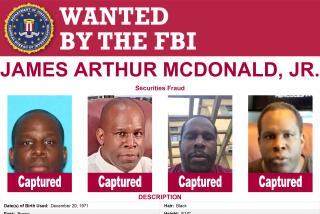Broadcom founders’ fresh legal woes
- Share via
In the latest legal twists for Broadcom Corp.’s billionaire co-founders, one is clinging to his freedom while the other tries to hang on to multimillion-dollar homes in Orange County and Las Vegas.
Henry Samueli and Henry T. Nicholas III were charged separately this year in an alleged scheme to manipulate stock options for employees of the Irvine microchip maker they created in 1991.
Samueli, 53, a philanthropist and owner of the Anaheim Ducks hockey team, pleaded guilty in June to one count of making a false statement to the Securities and Exchange Commission. He is to be sentenced Sept. 8.
Nicholas, 48, has pleaded not guilty to 21 counts of improperly backdating millions of stock options. He also has denied charges that he distributed drugs during parties at a warehouse and three homes, two of which the government has sued to seize from him.
In Samueli’s case, prosecutors have recommended five years’ probation and $12.2 million in fines and penalties, in a plea agreement that must be approved by U.S. District Judge Cormac J. Carney.
Samueli expressed remorse in a letter attached to a sentencing memorandum, filed Monday in federal court in Santa Ana, in which his lawyers argued that he should not be imprisoned.
Samueli apologized to “the government, the court and the community” and admitted that he lied on May 25, 2007, when he told regulators he was “not involved” with the granting of stock options at Broadcom.
“Of course, that was not the truth since I was involved in the process,” he wrote. “My statement before the SEC was completely out of character for me. I have tried to live my life in a way that showed that hard work and honesty were their own reward.”
Samueli’s remarks, first reported by the Orange County Register, broke his public silence on the allegations that led to his resignation as Broadcom’s chairman. He also has taken a leave of absence as chief technology officer for the company, which makes chips for mobile phones, Apple Inc.’s iPod and other products.
“My first instinct was to fight this case,” Samueli wrote. “The last thing I wanted was to have a felony on my record. I also did not want to accept the consequences of admitting guilt, including being labeled a felon, submitting to probation for five years and paying $12 million to the government.”
He now takes “full responsibility” for his actions and is prepared for the consequences, Samueli said.
His attorney, Gordon A. Greenberg, did not return a phone call seeking comment.
During the tech boom, Samueli and Nicholas made heavy use of stock options to attract and reward employees. Stock options, which are rights to buy shares at a set price on a future date, were routinely backdated by technology companies to take advantage of dates when stock prices were low.
Samueli and Nicholas didn’t receive backdated options, but prosecutors alleged they granted them to others, including some other top executives, to avoid having to report $2.2 billion in compensation costs.
Nicholas, who stepped down as Broadcom’s chief executive in 2003, is awaiting trial on the charges next year. He now must also make the case that two properties bought by his holding companies should not be forfeited to the government, which says the homes were used for illegal purposes.
They include a Newport Coast home bought by Caldicot Properties for $5.5 million in 2006 and a Las Vegas penthouse condominium purchased in 2002 by Britz Properties for $2.4 million, property records show. Both entities have filed claims of ownership of the properties, neither of which must be relinquished while the case is pending.
Former Nicholas employees interviewed previously by The Times have described both as places for parties at which the billionaire indulged in illicit drugs and doled them out to rock musicians and others.
In its forfeiture complaint filed in July, the U.S. attorney echoed those allegations.
“On many occasions, Nicholas used his private plane to transport controlled substances to the Las Vegas residence,” the lawsuit alleges. “Beginning in 2005, Nicholas maintained supplies of cocaine, GHB, nitrous oxide and Ecstasy at the Newport Beach residence, both for his own use and the use of his guests.”
Neither Nicholas’ attorney in the forfeiture case, James D. Riddet, nor Robert G. Magnuson, who manages the billionaire’s holding companies, returned phone calls Tuesday.
--
--
Times researcher Scott Wilson contributed to this report.







